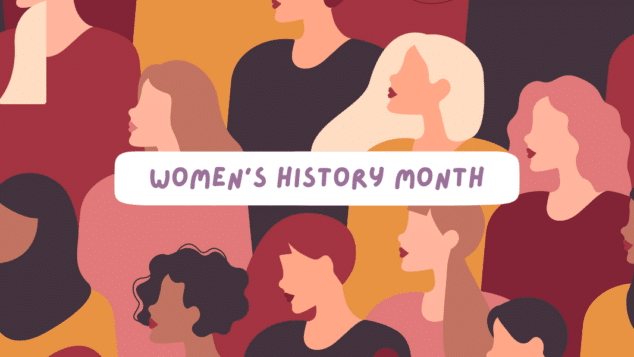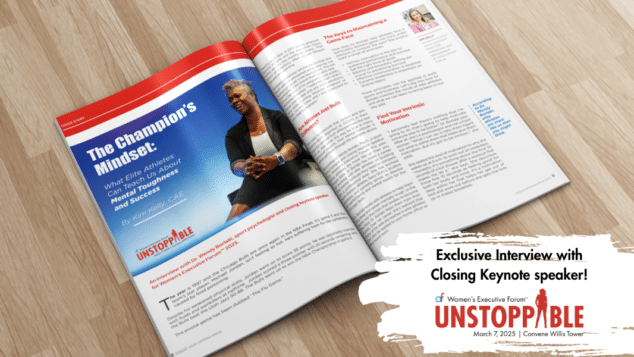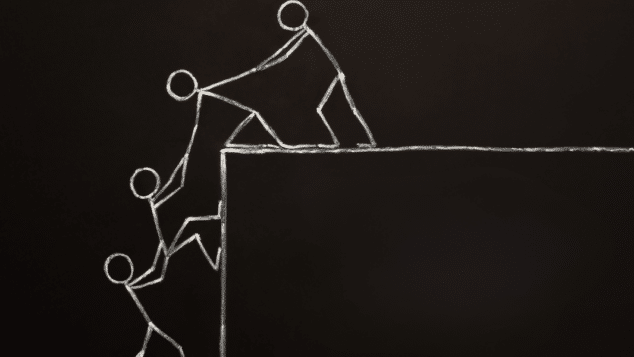Career Coach Carla Harris Wants You to be Kinder to Yourself

Association Forum’s Women’s Executive Forum (March 3, 2021) will feature a full day of education, including keynote speaker Carla Harris. Harris is CEO and Managing Director
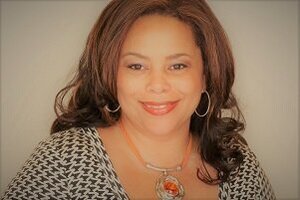
Carla Harris is CEO & Managing Director of The People Institute.
of The People Institute, a professional development training organization. She founded the company in 1997 to help C-level executives be more effective in their roles. Following is a conversation with Harris about women cultivating their own “board of directors,” being kinder to themselves, and thriving during the pandemic.
Association Forum: As the keynote speaker at Women’s Executive Forum, you’ll be talking about how women can create a personal board of directors. Tell us a little more about this concept.
Carla Harris: Just like a great organization has a board of directors, every leader should have a board of advisors. Some people are very formal and call it a personal board of directors. Other folks may call it their tribe, their village, mentors. When I talk about it in a training setting, we’re talking about being very specific and very intentional in creating a group of people that help support you in your goals and help hold you accountable.
Association Forum: That’s great. The COVID-19 pandemic has had an outsized effect on women. That includes joblessness, isolation, balancing work and home duties, caring for children, and more. During this time, do you have any thoughts on how women can push forward to thrive during such an unprecedented time in the world?
Harris: I think women have to learn to be kind to themselves. Women have to recognize that we don’t have to be everything to everyone. And to take that even further, we don’t have to be everything to ourselves. We have to be in a place where we are able to ask for help when we need it. And that’s really where this board comes in, because it helps us to call on those people for support, whether we’re crying out of frustration or we’re trying to figure out, well, how do I pivot my business? How do I deal with a staff that’s now remote? How do I maintain the engagement of a team that, in some cases, may not even been fully engaged prior to the pandemic?
Association Forum: I love that idea of being kinder to ourselves.
Harris: We really have to give ourselves a break—especially entrepreneurs. We believe that so much is riding on our shoulders, that we have to be able to do it all, be it all, have it all.
Association Forum: Thanks for your insight. Switching focus, right now we’re all working remote and the line between work and home responsibilities can get fuzzy. How do we manage all the video conferencing, our in-home offices, helping kids with e-learning, and everything else we’re juggling right now?
Harris: My personal practice is that I give myself 15 minute buffers between every Zoom session to get up stretch, walk around. We have to keep our blood flowing. Set reminders to get up and move. We have to do that because it’s just not healthy for us to sit for hours at a time. And one of the things I’ve heard during this pandemic is that people are working more from home than they did when they would have a commute. And they had that sort of decompression time during the commute, you know, heading back home.
Secondly, if you have a partner, evaluate your partnership and make sure that it’s equitable. And if it wasn’t always equitable, establish some boundaries so that so that it becomes more equitable and the approach to life within the home is more balanced. That’s the first thing.
If you do not have a partner, then build in some time with your children that is specifically with your children: cook together or do chores together. I think this is a time for us to be able to look at our kids and find appropriate responsibilities to help you right now; and it will help them grow in the long term.
Association Forum: Take the help where you can get it.
Harris: Yes. It works the exact same way in the workplace as well. When you value your team members, when you show respect across the board, then it makes everyone feel more engaged and they want to be in a workplace that values who they are and what they bring to the table.
Association Forum: Definitely. So how about professionals who are single and don’t have a partner or kids? How can they unplug from work since they have less people pulling them away?
Harris: I would suggest for them to set personal boundaries. So that at whatever time they choose for themselves, they’re going to shut down. Maybe you stop and have dinner. So you stop. And you intentionally have dinner. Sit at the table, you don’t have it standing up. If you’re a wine drinker, grab a glass of wine and really enjoy the meal that you’re eating. And that gives you an opportunity to sort of separate yourself a bit. If you choose to work more after dinner, make sure to set a cutoff time. So, after you go back to work for an hour or so, and then you’re done for the day. Learn to create a boundary for yourself so that you have time to decompress.
Association Forum: I find that to be so true. The work will be waiting for you tomorrow.
Harris: Yes. One of the strategies I use with my coaching clients is a block schedule. We literally block every waking hour, and we block it with everything. So, if you want to take a morning walk with your kids, put it in your calendar. If you want to have dinner with your husband or your partner, put it in your calendar. And I find that clients like that because they are already living by their calendars, but they’re still putting in the personal time instead of separating the two areas.
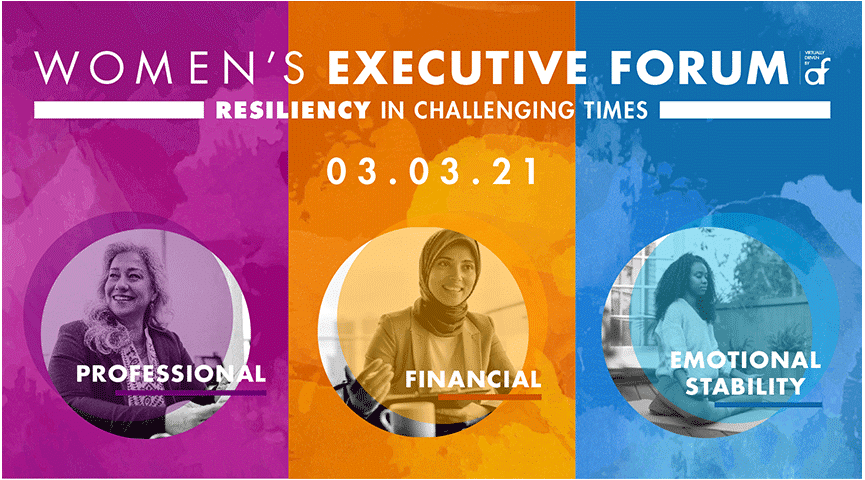
Register for Women’s Executive Forum on Wednesday, March 3, 2021 to see Carla Harris’ keynote presentation.
Association Forum: How else can we set boundaries?
Harris: When I work with clients on the life part of coaching, I require that you do something just for you, every day for 30 minutes.
Every day, for 30 minutes. It’s about finding something that’s just yours and enjoying it. And, oh my gosh, when you do that, just imagine how it makes you feel. And some people can’t get in the full 30 minutes. Some people only can get in 15 minutes, but whatever you get in, let’s start building it up so that you can allow yourself that “me time” to unwind.
Association Forum: Definitely. It’s easy to forget that you need to come back to what actually fills you up.
Harris: Absolutely. And for leaders it’s really important. Again, we believe that the whole world is on our shoulders. So, when you’re a leader, you have the world on your shoulders and then if you’re a female leader, it’s like doubling that weight. We’ve really placed it on ourselves. We can recognize that it is absolutely okay to not be perfect. We’re just being human.
Association Forum: I agree, but how can we gain the acceptance necessary to “just be human.”
Harris: Wow. That’s a tough question. I think it’s an ongoing goal. You know, I think the older we get, the easier it becomes. I’m in my mid-fifties and it is sometimes still a struggle because you do want to have it. You want to always appear that you have it all together. And that’s why the quiet time is so critical because we have to be able to have those moments where we can be with ourselves and recognize the feelings and then we capture those feelings. We have to capture the feelings because when we capture them, we can take it. It’s like physically taking that need to be “perfect” and looking at it and saying, you know what? This is not for me right now.
And put it away. And if we can learn to capture our feelings and our thoughts as they’re happening, we can say, you know what? I can sit down. I can say, no.
Association Forum: Saying no can be so difficult.
Harris: I was working with a client in December and she says, “I just don’t know how to say no.” I said, give yourself 24 hours. So now your answer is always: I’ll let you know in 24 hours. So, then you can come back. And even if you have to use that time to get the courage to say, no, you’ve given yourself an opportunity. And there were times when she was putting this into practice, that the issue actually resolved itself before the 24 hours were up.
Association Forum: That’s an excellent tip!
Harris: It works. I still use, and I don’t have a problem saying no. But it has just become such a part of my practice and I use that time to think about it and process what it means. If I say yes, what does it mean? What does it mean for me? What does it mean for my time? What does it mean for my business, my family life? I want to process that for before I commit, because when I commit, I’m all in.
Association Forum: That’s great. Is there anything else you want to add?
Harris: I would just say that after the tumultuous year we all experienced, just be kinder to yourself. My heart goes out to everyone struggling right now. It’s okay to breathe and it’s okay to give yourself a break.
Tags
Related Articles
It’s Not Too Late! Celebrate Women’s History Month in March
Celebrate Women's History Month in Chicago with these five impactful ideas to honor, empower, and...
The Champion’s Mindset: What Elite Athletes Can Teach Us About Mental Toughness and Success
An interview with Dr. Wendy Borlabi, sport psychologist and closing keynote speaker for Women’s Executive...
Great Bosses, Greater Impact: Leadership Lessons that Stick
The best bosses leave more than instructions—they leave echoes of confidence, creativity, and leadership that...


